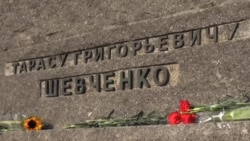MOSCOW —
The complex ethnic, historical, cultural, economic and religious links between Russia and Ukraine were on display Friday in Moscow during the 200th birthday celebrations for Taras Shevchenko, who composed poetry in Ukrainian and prose in Russian.
Participants from both nations took part including Ukraine's ambassador to Moscow, Volodymyr Yelchenko.
“Unfortunately today’s ceremony is happening on the backdrop of events that I will not comment on, out of respect for our mutual holiday,” he said.
It is a crisis of two nations deeply entwined. Experts estimate there are between three- to five-million Ukrainians in Russia — many of them undocumented migrant workers who send their earnings back to Ukraine. Russian and Ukraine did $45 billion of trade in 2012.
Beyond the literature of Shevchenko, Pavel Felgenhauer, a defense analyst, identifies a mixed language called Surzhik, which translate into "mixed-grain bread," that common in Crimea, eastern Ukraine, and neighboring Russian areas.
“It’s not classical Ukrainian literature, and it’s not Russian," he said. "It’s a kind of non-literary talking language, which everyone finds disgusting and funny.”
Living in Moscow for 34 years, Ukrainian-Russian Vera Onipko grew up in Ukraine’s deep east near Lugansk, a hotbed of Surzhik speakers.
“At school we had classes in Russian language and literature, Ukrainian language and literature. But for math, algebra, or geometry, teachers spoke in the mixed-language,” recalled Onipko.
The nations’ churches have ancient ties dating back to the eighth century Kievan-Rus — the proto-nation for both Russia and Ukraine. Church leaders have had a public exchange of letters decrying violence and promoting brotherhood.
According to Russian President Vladimir Putin, these brotherly relations could ultimately prevent armed conflict.
“Ukrainian and Russian servicemen will not stand on opposite sides of the barricades. They will stand on the same side,” he said.
But the question is — if tensions continue to rise, will Putin's assessment hold?
Participants from both nations took part including Ukraine's ambassador to Moscow, Volodymyr Yelchenko.
“Unfortunately today’s ceremony is happening on the backdrop of events that I will not comment on, out of respect for our mutual holiday,” he said.
It is a crisis of two nations deeply entwined. Experts estimate there are between three- to five-million Ukrainians in Russia — many of them undocumented migrant workers who send their earnings back to Ukraine. Russian and Ukraine did $45 billion of trade in 2012.
Beyond the literature of Shevchenko, Pavel Felgenhauer, a defense analyst, identifies a mixed language called Surzhik, which translate into "mixed-grain bread," that common in Crimea, eastern Ukraine, and neighboring Russian areas.
“It’s not classical Ukrainian literature, and it’s not Russian," he said. "It’s a kind of non-literary talking language, which everyone finds disgusting and funny.”
Living in Moscow for 34 years, Ukrainian-Russian Vera Onipko grew up in Ukraine’s deep east near Lugansk, a hotbed of Surzhik speakers.
“At school we had classes in Russian language and literature, Ukrainian language and literature. But for math, algebra, or geometry, teachers spoke in the mixed-language,” recalled Onipko.
The nations’ churches have ancient ties dating back to the eighth century Kievan-Rus — the proto-nation for both Russia and Ukraine. Church leaders have had a public exchange of letters decrying violence and promoting brotherhood.
According to Russian President Vladimir Putin, these brotherly relations could ultimately prevent armed conflict.
“Ukrainian and Russian servicemen will not stand on opposite sides of the barricades. They will stand on the same side,” he said.
But the question is — if tensions continue to rise, will Putin's assessment hold?





